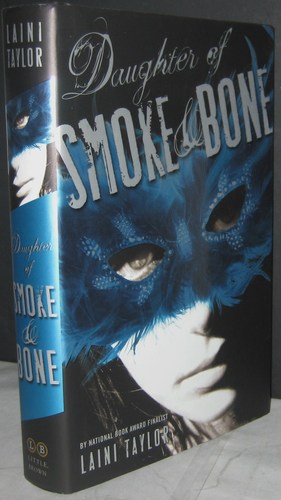In any case, that's not what I actually wanted to post about today. Today, I wanted to write a long-awaited (but oddly timely) review of a book I enjoyed hugely: Daughter of Smoke & Bone, by Laini Taylor. Daughter of Smoke & Bone will always have a special place in my heart as the first book I ever listened to as an audio book (available through Audible). The reading is brilliant in every possible way, and it's part of what sent me down the path of audiobooks.
Audiobooks are not what I'm hear to talk about, however. I'm here to talk about Karou.
Karou is an art student in Prague. Her hair grows in blue (not rainbows, but it'll do). Unbeknownst to her friends - including the Fierce and Tiny Zusana - Karou was raised by a very strange family of chimerical humanoids led by a bull-headed dragon-bodied wish-merchant named Brimstone. Karou is a daughter of three worlds: the human world that her body makes her a part of, the tiny world of her family and Brimstone's shop where he buys teeth and sells wishes, and a third, mysterious world - the world beyond the other door in Brimstone's shop - a world she has never visited, but feels drawn to nonetheless. Karou's desire to explore this other world - and that world's troubles, pursuing her - will draw her into... well, an adventure. There are also star-crossed romances, buried secrets, and a great many things that are not what they seem.
What I love most about Daughter of Smoke & Bone was the skillful way Taylor builds her story. This is an incredibly tight novel - barely a wasted letter, let alone a word - with a mystery that builds from the first page to an inevitable, almost Grecian tragedy. By the time the mystery breaks, it may not be a surprise to you - I guessed it, and so did the Abigail - but that's not the point. The point is the elegance of the structure, the beautiful and terrible shape of the doom that comes to Karou and... ah, but that would be telling.
Taylor creates some truly enchanting characters. I have already mentioned Karou the Blue-Haired and Zusana that Fierce and Tiny. There are others as well, all of them charming and odd, many of them lovable, and all of them very engaging. Taylor's talent for characterization also serves to aid the shape of her tragedy, with characters who you really can imagine falling in love and hate, keeping secrets, in just the wrong way.
Finally, the places. Ah, the places...
You should know - I spent four months in Prague when I was a high school student, thanks to the now-defunct Lauder Exchange Program. Prague sank its sooty tentacles deep into my soul, and even now when I imagine a city of Eastern European quirkiness, twisted streets and statuary, beautiful and bloody history strewn about like sea glass on a beach, where modern net-savvy kids tryst beneath the horse's tail1 and old men still sit in coffee houses and drink a truly epic amount of beer. I never went to Poison Kitchen (I don't think it's real, unfortunately), but I did once go to a nightclub built over a branch of the Vltava River so that the water rushed beneath us, visible through glass floors. And I once got drunk on awful Czech wine in a medieval basement with enormous kegs set into the wall, drunk enough that I sang Czech songs I didn't understand...
I went and had a Prague-gasm all over my blog, didn't I?
Well, then. I think you understand part of why I enjoyed the book so much. Taylor did a very good job of evoking Prague.
In any case, this is a book that you can't afford to miss, especially with the second book rumored to be appearing shortly (and apparently a movie deal, according to the book's Wikipedia page). I advise you to pick it up and read it as soon as possible.
Otherwise, what happens next... might not end well.
• • •
1. I looked all over the internet for a link to this, but I don't think there is one. Under communism, the Czechs would say "see you under the horse's tail," when they intended to meet each other in secret to discuss counter-revolutionary action. "Under the horse's tail" referred to Saint Wenceslas Square, where the rebels would frequently meet.

No comments:
Post a Comment